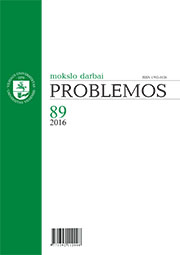HUSSERLIO IR HEIDEGGERIO GINČAS DĖL FENOMENOLOGIJOS
THE HUSSERL – HEIDEGGER CONTROVERSY ABOUT PHENOMENOLOGY
Author(s): Mintautas GutauskasSubject(s): Metaphysics, Contemporary Philosophy, Existentialism, Philosophy of Science, Phenomenology, Hermeneutics
Published by: Vilniaus Universiteto Leidykla
Keywords: phenomenology; Edmund Husserl; Martin Heidegger; givenness; intuition;
Summary/Abstract: The article aims to explain the controversy between Husserl and Heidegger about the grounds, possibilities, and aims of phenomenology. First the author notes the commitment of both philosophers to phenomenology as the new way of thinking which suspends a naivety of objectivism, gives answers about transcendental preconditions of knowledge and guides to the Ursprungswissenschaft. Then the paper discusses which evidence, intuitions and assumptions became the base for the absolutely grounded science in Husserl’s philosophy. Further, Heidegger’s criticism of the givenness is analyzed, the way he opens the strata of historicity and guides to the deeper question – what is a human being and what is the meaning of being? Lastly is noted that many issues under discussion overlap, but the ultimate goals of both thinkers – the absolutely grounded science and the question of being – lead them in different directions.
Journal: Problemos
- Issue Year: 2016
- Issue No: 89
- Page Range: 21-34
- Page Count: 14
- Language: Lithuanian

